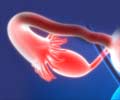- FDA-approved drug clofarabine (Clolar™) used to treat leukemia may soon be tested as a treatment for Ewing sarcoma
- Ewing sarcoma is an uncommon and aggressive bone cancer in children and adolescents that does not respond very well to conventional chemotherapy agents
Ewing sarcoma does not have many effective treatment options available currently and finding one for the disease has also been a considerable challenge. Additionally, discovering a new drug for any disease from scratch is a tedious process that can take a very long time, with the results not measuring up to expectations sometimes.
Hence, the research team sought an easier and quicker method to find new treatments for a disease by sifting through already existing drugs (to treat other diseases) to try and see if any of them would be effective in the second condition (in this instance Ewing sarcoma) as well.
Finding a Drug That Can Bind To Ewing Sarcoma Protein CD99
Aykut Üren, an associate professor of molecular biology at Georgetown University School of Medicine and a member of Georgetown Lombardi collaborated with a team of investigators from Georgetown Lombardi, and from Italy and Turkey to find a drug for Ewing sarcoma, specifically targeting CD99.CD99 is a protein expressed by Ewing sarcoma cells that aids in tumor growth and progression. It is a transmembrane protein that spans across the thickness of the cell membrane with one end sticking out of the cell and the other end placed inside the cell. In fact, the diagnosis of Ewing sarcoma depends not only on the microscopic appearance of the cancer cells but also on detecting the CD99 protein on the tumor cells by specialized techniques.
- The team searched the National Cancer Institute database of 2,607 compounds to find one that could be potentially beneficial in Ewing sarcoma patients.
- Instead of the conventional tailor-made approach of finding a compound that would fit into a pre-selected slot or groove on the CD99 protein, the team looked for compounds that would bind anywhere on CD99 and see what would happen.
- Although they found 150 compounds that could bind to CD99, only two demonstrated a beneficial effect.
- One was clofarabine, a drug that was FDA-approved for treating relapsed or refractory acute lymphoblastic leukemia (ALL) in children alongwith at least two other types of treatment.
- The other was cladribine (Leustatin™) used to treat hairy cell leukemia, B-cell chronic lymphocytic leukemia, and multiple sclerosis, and FDA approved as well.
- When these agents bound to the CD99 protein, it was found that both of them dramatically reduced tumor growth in cell culture and animal studies, but clofarabine destroyed the tumor.
- Significant toxicities were noted (infertility, other cancers, heart toxicity) with both agents, as the agents affect not only the external aspect of CD99 but the interior of the cell as well, altering cellular DNA metabolism and thus producing the resulting toxicity.
Merits of the Study
- The team believes that clofarabine in its existing form can soon be tested as a possible treatment for Ewing sarcoma in a clinical trial.
- Current study shows that inhibiting the CD99 protein can help develop treatments for other cancers and immune disorders that express this protein.
In the words of Üren, "Our goal is to improve both survival and quality of life for Ewing sarcoma patients, and this drug, when used in combination with other therapies, may do the trick. Our work also provides the knowledge on how to make safer derivatives with fewer side effects for Ewing sarcoma patients."
- CD99 inhibits neural differentiation of human Ewing sarcoma cells and thereby contributes to oncogenesis. - (https://www.ncbi.nlm.nih.gov/pubmed/20197622)
- Clofarabine - (https://en.wikipedia.org/wiki/Clofarabine)













